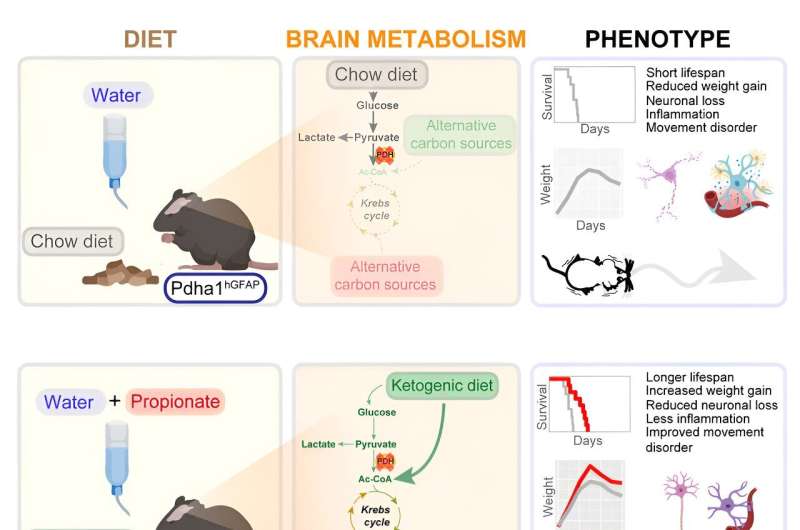This article has been reviewed according to Science X's editorial process and policies. Editors have highlighted the following attributes while ensuring the content's credibility:
fact-checked
peer-reviewed publication
trusted source
proofread
Researchers discover potential new therapy for lethal metabolomic disease

Researchers at the Abimael Laboratory of Neurometabolism and the Neurometabolomics & Neuroinformatics core at Mount Sinai have discovered a potential new therapy, improved an existing treatment, and identified a disease biomarker in a mouse model of a lethal neurometabolic disease in humans.
The study
, published in Cell Metabolism, revealed that propionate (a short-chain fatty acid that we can consume or produce through the
Supplementation of propionate along with a modified ketogenic diet (a high fat, low-carbohydrate diet) started before conception, continued throughout pregnancy, and post-natally prolonged lifespan and mildly improved neurological outcomes in PDHD mice. Elevated glucose uptake and glycolysis were also observed as indicators of disease progression.
To map the metabolic network in the PDHD brain, the researchers used comprehensive imaging techniques, including: magnetic resonance imaging; magnetic resonance spectroscopy; hyperpolarized MRI (highly sensitive imaging to detect labeled chemical compounds in organs in vivo), flourodeoxyglucose positron emission tomography (imaging used to study metabolism of organs in vivo); 14C-autoradiography (imaging used to visualize radioactive chemical compounds in organs); and 13-NMR spectroscopy (imaging through which chemicals are labeled with a special carbon to track where metabolites go in the tissue).
The research uncovers new therapeutic avenues for treating PDHD, a mitochondrial disorder that causes severe neurological impairments and shortens lifespan in affected patients. By identifying propionate as a potential metabolic treatment, the study offers potential for enhancing current treatment protocols for patients.
The study concludes that propionate supports brain metabolism in PDHD. When combined with a modified ketogenic diet starting before conception and continuing throughout pregnancy and postnatally, propionate potentially offers promising therapeutic benefits, including extended lifespan and mildly improved neurological function in the mouse model.
More information: Isaac Marin-Valencia et al, Imaging brain glucose metabolism in vivo reveals propionate as a major anaplerotic substrate in pyruvate dehydrogenase deficiency, Cell Metabolism (2024). DOI: 10.1016/j.cmet.2024.05.002















